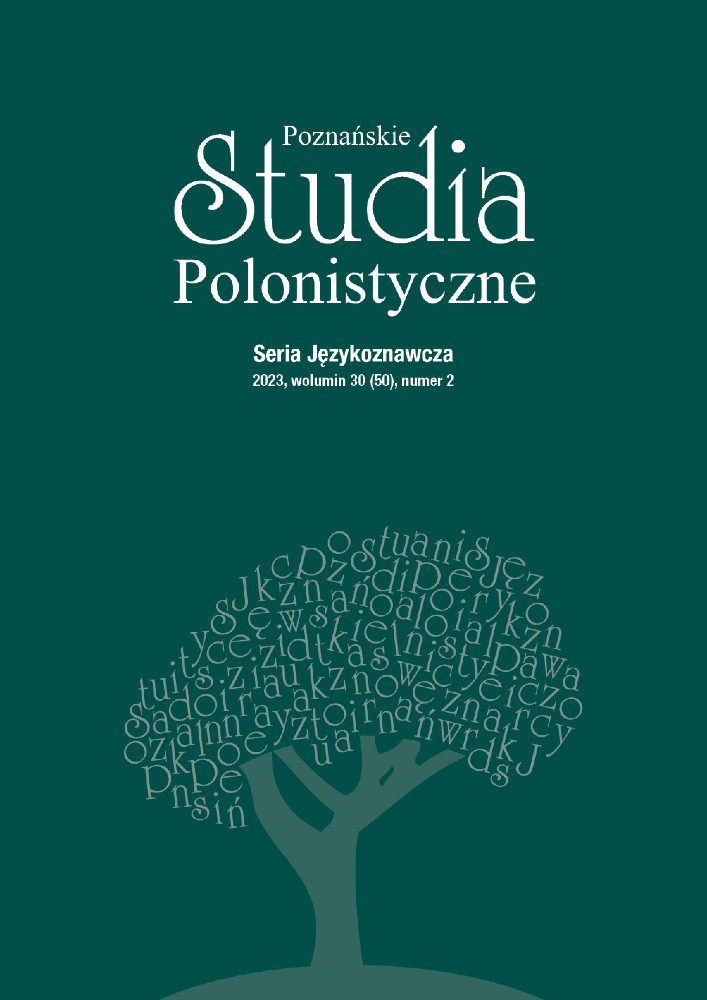Abstrakt
The aim of the paper is to present and discuss the portrayal of the COVID-19 pandemic in the media. Our primary focus is on Polish press articles, supplemented by occasional references to international sources. The analysis reveals that, much like in previous pandemics, the media narrative around COVID-19 is heavily metaphorical, aiming to simplify the understanding of this unfamiliar event. The most common metaphors involve war and battle, which have sparked controversy and significant criticism for their militaristic connotations. Our paper also examines alternative representations of the pandemic, such as natural disasters (with the fire metaphor being particularly apt), sports (including football, mountain climbing, and marathons), and other innovative comparisons (comparing the pandemic to an animal, driving a car, etc.).
Bibliografia
Balsonaro J. (20 April 2020), Brazil’s Balsonaro joins protest against coronavirus restrictions. https://www.aljazeera.com/news/2020/4/20/brazils-bolsonaro-joins-protest-against-coronavirus-restrictions [accessed: 10 May 2021].
Biden J. (26 November 2020), Biden Thanksgiving speech: We’re at war with the virus, not each other. https://www.bbc.com/news/election-us-2020-55078066 [accessed: 10 May 2021].
Cuomo A. (26 March 26 2020), Governor Cuomo announces significant donations to help increase the state’s supply capacity amid ongoing COVID-19 pandemic. https://www.governor.ny.gov/news/governor-cuomo-announces-significant-donations-help-increase-states-supply-capacity-amid [accessed: 10 May 2021].
Ghebreyesus T.A. (11 March 2020), WHO Director-General’s opening remarks at the media briefing on COVID-19–23 March 2020; https://www.who.int/director-general/speeches/detail/who-director-general-s-opening-remarks-at-the-media-briefing-on-covid-19---23-march-2020 [accessed: 20 March 2020].
Johnson B. (17 March 17 2020), “This enemy can be deadly”: Boris Johnson invokes wartime language. https://www.theguardian.com/world/2020/mar/17/enemy-deadly-boris-johnson-invokes-wartime-language-coronavirus [accessed: 12 April 2021].
Kaszuba-Janus M. (2020): Belvedere Catering dostarcza posiłki dla służby zdrowia, https://www.horecanet.pl/belvedere-catering-dostarcza-posilki-dla-sluzby-zdrowia/ [accessed: 15 February 2021].
Macron E. (16 March 2020), Coronavirus: we are at war – Macron. https://www.bbc.com/news/av/51917380 [accessed: 10 May 2021].
Morrison S. (8 April 2020): ‘We will never surrender’: Scott Morrison channels Winston Churchill as he says Australia is ‘under attack’ from coronavirus – and warns the ‘battle’ may last longer than 6 months, https://www.dailymail.co.uk/news/article-8198577/We-never-surrender-Scott-Morrison-channels-Winston-Churchill.html [accessed: 10 May 2021].
Musu C. (2020): War metaphors used for COVID-19 are compelling but also dangerous. https://theconversation.com/war-metaphors-used-for-covid-19-are-compelling-but-also-dangerous-135406 [accessed: 10 May 2021].
Nerlich B. (2020): Metaphors in the time of coronavirus, https://blogs.nottingham.ac.uk/makingsciencepublic/2020/03/17/metaphors-in-the-time-of coronavirus/ [accessed: 12 April 2021].
Sánchez P. (12 April 2020): Sánchez advierte de que llega la “ola más dura”y pide fortaleza y unidad. https://elpais.com/espana/2020-03-21/sanchez-advierte-de-que-llega-la-ola-mas-duray-pide-fortaleza-y-unidad.html [accessed: 10 May 2021].
Selwant K. (2020): Pandemia jak maraton. Wywiad z psychologiem sportowym. https://zdrowie.radiozet.pl/Psychologia/ABC-psychologii/Pandemia-jak-maraton.-Wywiad-z-psychologiem-sportowym [accessed: 15 August 2022].
Steinmeier F.-W. (11 April 2020): Pandemic Not War But ‘Test Of Humanity’: German President, https://www.barrons.com/news/pandemic-not-war-but-test-of-humanity-german-president-01586617505 [accessed: 10 May 2021].
Triggle N. (2020): Coronavirus: Is the NHS ready for the surge in cases? https://www.bbc.co.uk/news/health-51714498 [accessed: 12 April 2021].
Dunaj B. (ed.) (2001), Słownik współczesnego języka polskiego. Vol. 1–2. Warszawa.
Baehr P., (2006), Battle Language and the Hong Kong SARS Outbreak of 2003. “Economy and Society” vol. 35, no.1, p. 42–64. DOI: https://doi.org/10.1080/03085140500465840
Bryła W., Bryła-Cruz A. (2021), Retoryka “okołokoronawirusowa.” Szkice językowo-kulturowe. Lublin.
Craig D. (2020), Pandemic and its Metaphors: Sontag Revisited in the Covid-19 Era. “European Journal of Cultural Studies” vol. 23, no. 6, p. 1025–1032. DOI: https://doi.org/10.1177/1367549420938403
Fleck L. (1979), Genesis and Development of a Scientific Fact. Bradley and Trenn trans., Chicago.
Honigsbaum M. (2013), Regulating the 1918–19 Pandemic: Flu, Stoicism and the Northcliffe Press. “Medical History” vol. 57, no. 2, p. 165–185. DOI: https://doi.org/10.1017/mdh.2012.101
Nerlich B., Jaspal R. (2021), Social representations of ‘social distancing’ in response to Covid-19 in the UK media. “Current Sociology,” p. 1–18. DOI: https://doi.org/10.1177/0011392121990030
Rosalak M. (2001): Wielkie zarazy ludzkości. Warszawa.
Semino E. (2021), Not Soldiers but Fire-fighters – Metaphors and Covid-19. “Health Communication” vol. 36, no. 1, p. 50–58. DOI: https://doi.org/10.1080/10410236.2020.1844989
Sontag S. (1999), Choroba jako metafora. AIDS i jego metafory. Warszawa.
Sznajderman M. (1994), Zaraza. Mitologia dżumy, cholery i AIDS. Warszawa.
Licencja
Prawa autorskie (c) 2023 Władysława Bryła, Agnieszka Bryła-Cruz

Utwór dostępny jest na licencji Creative Commons Uznanie autorstwa – Bez utworów zależnych 4.0 Międzynarodowe.
Autorzy
Autor oświadcza, że przysługują mu osobiste i majątkowe prawa autorskie do utworu publikowanego w czasopiśmie „Poznańskie Studia Polonistyczne. Seria Językoznawcza”, oraz że nie są one ograniczone w zakresie objętym umową autorską, oraz że utwór jest dziełem oryginalnym i nie narusza majątkowych lub osobistych praw autorskich innych osób, ani innych praw osób trzecich, w tym dóbr osobistych.
Autor(zy) zachowują pełne prawa do dalszego, swobodnego rozporządzania utworem, udzielając Uniwersytetowi im. Adama Mickiewicza w Poznaniu niewyłącznej i nieodpłatnej licencji CC BY-ND 4.0 Międzynarodowe na korzystanie z utworu bez ograniczeń terytorialnych przez czas nieokreślony na określonych umową autorską polach eksploatacji.
Użytkownicy
Zainteresowani użytkownicy internetu uprawnieni są do korzystania z utworów opublikowanych od 2016 roku w „Poznańskich Studiach Polonistycznych. Serii Językoznawczej” pod następującymi warunkami:
- uznanie autorstwa – obowiązek podania wraz z rozpowszechnionym utworem informacji, o autorstwie, tytule, źródle (odnośniki do oryginalnego utworu, DOI) oraz samej licencji;
- bez tworzenia utworów zależnych – utwór musi być zachowany w oryginalnej postaci, nie można bez zgody twórcy rozpowszechniać np. tłumaczeń, opracowań.
Do wszystkich tekstów opublikowanych przed 2016 r. prawa autorskie są zastrzeżone.
Inne
Uniwersytet im. Adama Mickiewicza w Poznaniu zachowuje prawo do czasopisma jako całości (układ, forma graficzna, tytuł, projekt okładki, logo itp.).

